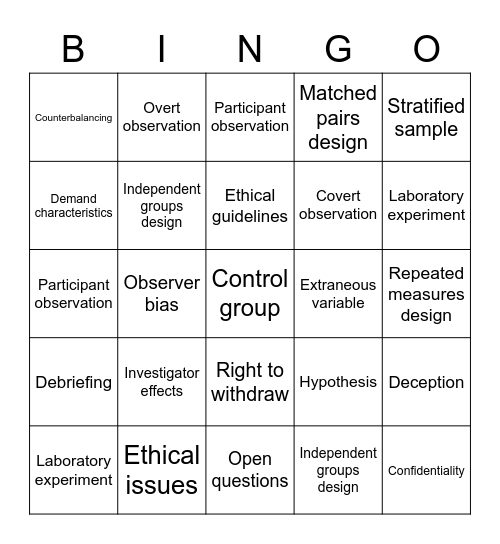

This bingo card has 105 words: Volunteer Sampling, Time sampling, Stratified sample, Single-blind control, Social desirability bias, Scattergram, Right to withdraw, Repeated measures design, Quasi experiment, Qualitative data, Quantitative data, Protection of participants, Free!, Pilot study, Positive correlation, Overt observation, Participant observation, Observer bias, Open questions, Operationalising variables, Opportunity sample, Non-directional hypothesis, Natural experiment, Naturalistic observation, Negative correlation, Investigator effects, Laboratory experiment, Matched pairs design, Informed consent, Inter-observer reliability, Hypothesis, Independent groups design, Independent variable, Extraneous variable, Face validity, Field experiment, Event sampling, Experimental group, Ethical guidelines, Ethical issues, Double blind control, Debriefing, Deception, Demand characteristics, Dependent variable, Counterbalancing, Covert observation, Control group, Controlled observation, Confidentiality, Closed questions, Co-variables, Behavioural categories, Volunteer Sampling, Time sampling, Stratified sample, Single-blind control, Social desirability bias, Scattergram, Right to withdraw, Repeated measures design, Quasi experiment, Qualitative data, Quantitative data, Protection of participants, Pilot study, Positive correlation, Overt observation, Participant observation, Observer bias, Open questions, Operationalising variables, Opportunity sample, Non-directional hypothesis, Natural experiment, Naturalistic observation, Negative correlation, Investigator effects, Laboratory experiment, Matched pairs design, Informed consent, Inter-observer reliability, Hypothesis, Independent groups design, Independent variable, Extraneous variable, Face validity, Field experiment, Event sampling, Experimental group, Ethical guidelines, Ethical issues, Double blind control, Debriefing, Deception, Demand characteristics, Dependent variable, Counterbalancing, Covert observation, Control group, Controlled observation, Confidentiality, Closed questions, Co-variables and Behavioural categories.
⚠ This card has duplicate items: Volunteer Sampling (2), Time sampling (2), Stratified sample (2), Single-blind control (2), Social desirability bias (2), Scattergram (2), Right to withdraw (2), Repeated measures design (2), Quasi experiment (2), Qualitative data (2), Quantitative data (2), Protection of participants (2), Pilot study (2), Positive correlation (2), Overt observation (2), Participant observation (2), Observer bias (2), Open questions (2), Operationalising variables (2), Opportunity sample (2), Non-directional hypothesis (2), Natural experiment (2), Naturalistic observation (2), Negative correlation (2), Investigator effects (2), Laboratory experiment (2), Matched pairs design (2), Informed consent (2), Inter-observer reliability (2), Hypothesis (2), Independent groups design (2), Independent variable (2), Extraneous variable (2), Face validity (2), Field experiment (2), Event sampling (2), Experimental group (2), Ethical guidelines (2), Ethical issues (2), Double blind control (2), Debriefing (2), Deception (2), Demand characteristics (2), Dependent variable (2), Counterbalancing (2), Covert observation (2), Control group (2), Controlled observation (2), Confidentiality (2), Closed questions (2), Co-variables (2), Behavioural categories (2)
PSYCH | Ch. 2 Research Methods Bingo | Research Methods & Statistics | Year 11 ATAR Psychology - Science Inquiry | Quantitative Research Bingo
Share this URL with your players:
For more control of your online game, create a clone of this card first.
Learn how to conduct a bingo game.
With players vying for a you'll have to call about __ items before someone wins. There's a __% chance that a lucky player would win after calling __ items.
Tip: If you want your game to last longer (on average), add more unique words/images to it.